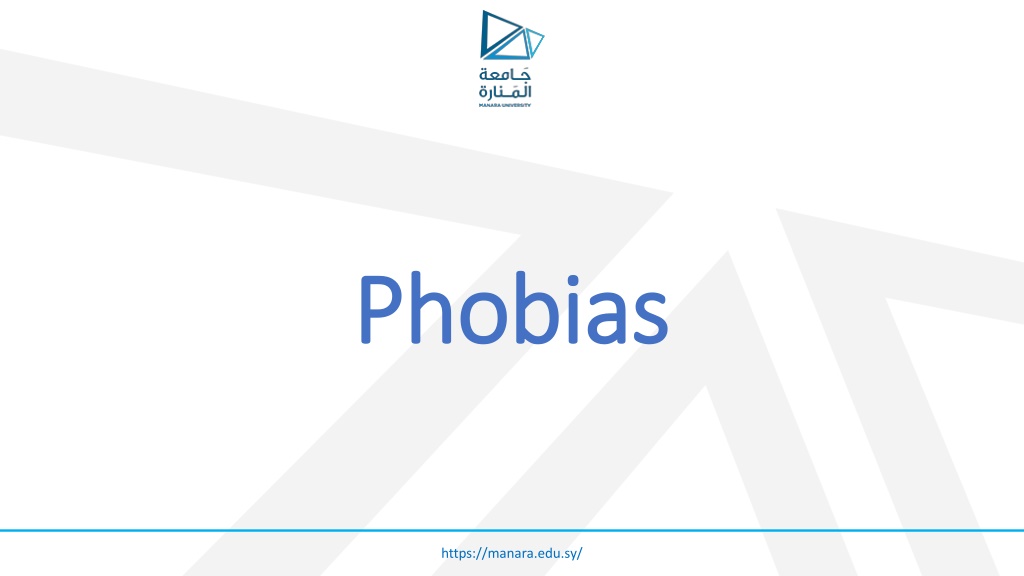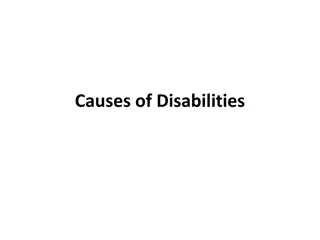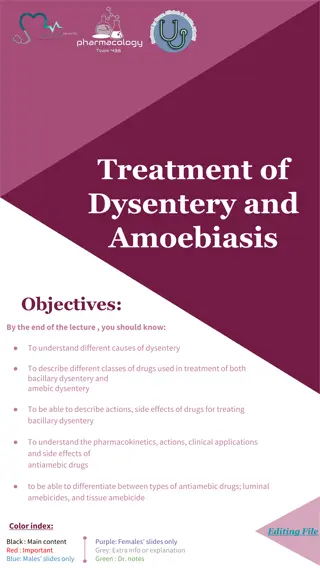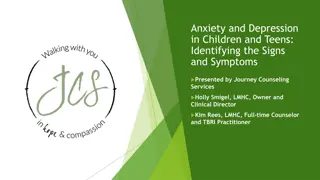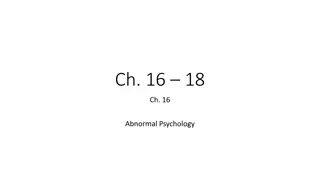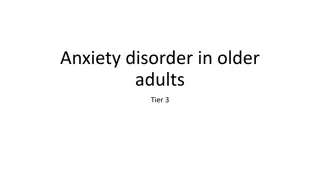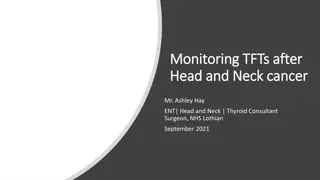Understanding Phobias: Types, Causes, and Treatment
A phobia is an extreme, irrational fear that can greatly impact a person's life. There are various types of phobias, such as specific phobias, with causes attributed to genetic and environmental factors. Treatment often involves cognitive-behavioral therapy and exposure therapy. Phobias can affect anyone and seeking help is crucial for managing them effectively.
Download Presentation

Please find below an Image/Link to download the presentation.
The content on the website is provided AS IS for your information and personal use only. It may not be sold, licensed, or shared on other websites without obtaining consent from the author. Download presentation by click this link. If you encounter any issues during the download, it is possible that the publisher has removed the file from their server.
E N D
Presentation Transcript
Phobias Phobias https://manara.edu.sy/ https://manara.edu.sy/
- - What is a phobia? - What are the types of phobia? - How can it be treated? -Some phobias https://manara.edu.sy/ https://manara.edu.sy/
What is a phobia? A phobia is an uncontrollable, irrational, and lasting fear of a certain object, situation, or activity. This fear can be so overwhelming that a person may go to great lengths to avoid the source of this fear. One response can be a panic attack. This is a sudden, intense fear that lasts for several minutes. It happens when there is no real danger. Who is affected by phobias? About 19 million Americans have one or more phobias that range from mild to severe. Phobias can happen in early childhood. But they are often first seen between ages 15 and 20. They affect both men and women equally. But men are more likely to seek treatment for phobias. https://manara.edu.sy/ https://manara.edu.sy/
What causes phobias? Research suggests that both genetic and environmental factors contribute to the start of phobias. Certain phobias have been linked to a very bad first encounter with the feared object or situation. Mental health experts don t know if this first encounter is necessary or if phobias can simply occur in people who are likely to have them. https://manara.edu.sy/ https://manara.edu.sy/
Specific phobias Specific phobia is an extreme fear of an object or situation that typically isn't harmful. Examples may include a fear of: Flying (fearing the plane will crash) Dogs (fearing the dog will bite or attack) Closed-in places (fear of being trapped) Tunnels (fearing a collapse) Heights (fear of falling) https://manara.edu.sy/ https://manara.edu.sy/
What are the characteristics of specific phobia? People with specific phobia know that their fear is extreme. But they can't overcome it. The problem is diagnosed only when the specific fear interferes with daily activities of school, work, or home life. There is no known cause, although they seem to run in families. They are also found slightly more often in women. If the object of the fear is easy to avoid, people with phobias may not seek treatment. Sometimes, however, they may make important career or personal decisions to avoid a situation that includes the source of the phobia. Treatment for specific phobia When phobias interfere with a person's life, treatment can help. For specific phobias, cognitive-behavioral therapy (CBT) with exposure treatment is advised. In exposure therapy, people are gradually exposed to what frightens them until the fear starts to fade. Relaxation and breathing exercises also help to ease symptoms. https://manara.edu.sy/ https://manara.edu.sy/
Social phobia What is social phobia? Social phobia is an anxiety disorder in which a person has significant anxiety and discomfort related to a fear of being embarrassed, humiliated, or scorned by others in social or performance situations. Even when they manage to confront this fear, people with social phobia usually: Feel very anxious before the event or outing Feel intensely uncomfortable throughout the event or outing Have lingering unpleasant feelings after the event or outing Social phobia often happens with the following: Public speaking Meeting people Dealing with authority figures Eating in public Using public restrooms https://manara.edu.sy/ https://manara.edu.sy/
What are the characteristics of social phobia? Although this disorder is often thought of as shyness, they are not the same. Shy people can be very uneasy around others, but they don't have the extreme anxiety in anticipating a social situation. Also, they don't necessarily avoid circumstances that make them feel self-conscious. In contrast, people with social phobia are not necessarily shy at all, but can be completely at ease with some people most of the time. Most people with social phobia will try to avoid situations that cause distress. Diagnosing social phobia Social phobia is diagnosed when the fear or avoidance significantly interferes with normal, routines, or is excessively upsetting. Social phobia disrupts normal life, interfering with career or social relationships. It often runs in families and may be happen along with depression or alcoholism. Social phobia often starts in early adolescence or even younger. Treatment for social phobia People with social phobia often find relief when treated with cognitive-behavioral therapy, medicine, or a mix of both. https://manara.edu.sy/ https://manara.edu.sy/
Agoraphobia What is agoraphobia? Agoraphobia involves the fear of having a panic attack in a place or situation from which escape may be hard or embarrassing. The anxiety of agoraphobia is so severe that panic attacks are not unusual. People with agoraphobia often try to avoid the location or cause of their fear. Agoraphobia involves fear of situations like the following: Being alone outside his or her home Being at home alone Being in a crowd Traveling in a vehicle Being in an elevator or on a bridge People with agoraphobia typically avoid crowded places like streets, crowded stores, churches, and theatres. https://manara.edu.sy/ https://manara.edu.sy/
What are the characteristics of agoraphobia? Most people with agoraphobia get it after first suffering a series of panic attacks. The attacks happen randomly and without warning, and make it impossible for a person to predict what will trigger the reaction. This unpredictability of the panic causes the person to anticipate future panic attacks and, eventually, fear any situation in which an attack may happen. As a result, they avoid going into any place or situation where previous panic attacks have happened. People with the disorder often become so disabled that they literally feel they cannot leave their homes. Others who have agoraphobia, do go into potentially "phobic" situations, but only with great distress, or when accompanied by a trusted friend or family member. People with agoraphobia may also have depression, fatigue, tension, alcohol or drug abuse problems, and obsessive disorders, making treatment crucial. https://manara.edu.sy/ https://manara.edu.sy/
Some types of phobias Glossophobia: This is known as performance anxiety, or the fear of speaking in front of an audience. People with this phobia have severe physical symptoms when they even think about being in front of a group of people. Acrophobia: This is the fear of heights. People with this phobia avoid mountains, bridges, or the higher floors of buildings. Symptoms include vertigo, dizziness, sweating, and feeling as if they ll pass out or lose consciousness. Claustrophobia: This is a fear of enclosed or tight spaces. Severe claustrophobia can be especially disabling if it prevents you from riding in cars or elevators. Aviophobia: This is also known as the fear of flying. Dentophobia: Dentophobia is a fear of the dentist or dental procedures. This phobia generally develops after an unpleasant experience at a dentist s office. It can be harmful if it prevents you from obtaining needed dental care. https://manara.edu.sy/ https://manara.edu.sy/
Hemophobia: This is a phobia of blood or injury. A person with hemophobia may faint when they come in contact with their own blood or another person s blood. Arachnophobia: This means fear of spiders. Cynophobia: This is a fear of dogs. Ophidiophobia: People with this phobia fear snakes. Nyctophobia: This phobia is a fear of the night time or darkness. It almost always begins as a typical childhood fear. When it progresses past adolescence, it s considered a phobia. https://manara.edu.sy/ 12 https://manara.edu.sy/
